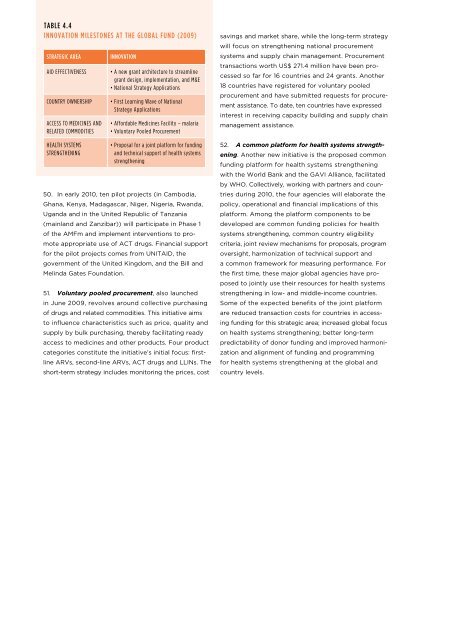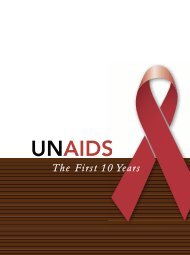Global Fund: Progress Report 2010 - unaids
Global Fund: Progress Report 2010 - unaids
Global Fund: Progress Report 2010 - unaids
You also want an ePaper? Increase the reach of your titles
YUMPU automatically turns print PDFs into web optimized ePapers that Google loves.
TABLE 4.4<br />
INNOVATION MILESTONES AT THE GLOBAL FUND (2009)<br />
STRATEGIC AREA<br />
AID EFFECTIVENESS<br />
COUNTRY OWNERSHIP<br />
ACCESS TO MEDICINES AND<br />
RELATED COMMODITIES<br />
HEALTH SYSTEMS<br />
STRENGTHENING<br />
INNOVATION<br />
• A new grant architecture to streamline<br />
grant design, implementation, and M&E<br />
• National Strategy Applications<br />
• First Learning Wave of National<br />
Strategy Applications<br />
• Affordable Medicines Facility – malaria<br />
• Voluntary Pooled Procurement<br />
• Proposal for a joint platform for funding<br />
and technical support of health systems<br />
strengthening<br />
50. In early <strong>2010</strong>, ten pilot projects (in Cambodia,<br />
Ghana, Kenya, Madagascar, Niger, Nigeria, Rwanda,<br />
Uganda and in the United Republic of Tanzania<br />
(mainland and Zanzibar)) will participate in Phase 1<br />
of the AMFm and implement interventions to promote<br />
appropriate use of ACT drugs. Financial support<br />
for the pilot projects comes from UNITAID, the<br />
government of the United Kingdom, and the Bill and<br />
Melinda Gates Foundation.<br />
51. Voluntary pooled procurement, also launched<br />
in June 2009, revolves around collective purchasing<br />
of drugs and related commodities. This initiative aims<br />
to influence characteristics such as price, quality and<br />
supply by bulk purchasing, thereby facilitating ready<br />
access to medicines and other products. Four product<br />
categories constitute the initiative’s initial focus: firstline<br />
ARVs, second-line ARVs, ACT drugs and LLINs. The<br />
short-term strategy includes monitoring the prices, cost<br />
savings and market share, while the long-term strategy<br />
will focus on strengthening national procurement<br />
systems and supply chain management. Procurement<br />
transactions worth US$ 271.4 million have been processed<br />
so far for 16 countries and 24 grants. Another<br />
18 countries have registered for voluntary pooled<br />
procurement and have submitted requests for procurement<br />
assistance. To date, ten countries have expressed<br />
interest in receiving capacity building and supply chain<br />
management assistance.<br />
52. A common platform for health systems strengthening.<br />
Another new initiative is the proposed common<br />
funding platform for health systems strengthening<br />
with the World Bank and the GAVI Alliance, facilitated<br />
by WHO. Collectively, working with partners and countries<br />
during <strong>2010</strong>, the four agencies will elaborate the<br />
policy, operational and financial implications of this<br />
platform. Among the platform components to be<br />
develop ed are common funding policies for health<br />
systems strengthening, common country eligibility<br />
criteria, joint review mechanisms for proposals, program<br />
oversight, harmonization of technical support and<br />
a common framework for measuring performance. For<br />
the first time, these major global agencies have proposed<br />
to jointly use their resources for health systems<br />
strengthening in low- and middle-income countries.<br />
Some of the expected benefits of the joint platform<br />
are reduced transaction costs for countries in accessing<br />
funding for this strategic area; increased global focus<br />
on health systems strengthening; better long-term<br />
predictability of donor funding and improved harmonization<br />
and alignment of funding and programming<br />
for health systems strengthening at the global and<br />
country levels.

















